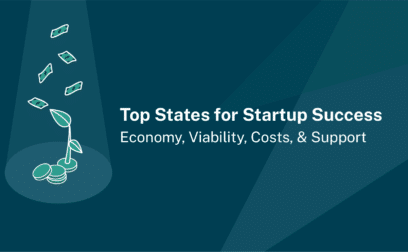TABLE OF CONTENTS
Page written by Chris Godfrey. Last reviewed on October 7, 2024. Next review due October 1, 2026.

You may be an entrepreneur who needs cash to get their start-up off the ground, or you could be a business owner who can’t wait for a traditional business loan to fund. Either way, a personal loan that relies on your personal credit score and income instead of your business’ performance may be a viable alternative to commercial financing.
A personal loan is a type of borrowing provided by financial institutions to individuals for various personal expenses. Personal loans can be obtained from banks, credit unions and online lenders.
Many personal loans do not require collateral, but they usually let you borrow less than you may get with a small business loan. Although there are different types of personal loan (see below), they all have the same general function: You receive a sum of money which must be repaid over a specified period, usually ranging from one to seven years. Repayments may be fixed (equal instalments paid each month), or they may be flexible (as with a bank line of credit).
Interest rates on personal loans will vary based on your credit score, income, and the lender’s policies. Common uses include debt consolidation, home renovations, medical expenses, and major purchases. You can also use the funds for business needs, unless the lender has a policy that says you can’t.

Pros
For some business owners, qualifying for a personal loan may be easier than obtaining business finance. Traditional business loans typically require an assessment of your company’s revenue, duration of operation, and your personal credit score. First-time business owners may lack the historical data that small-business lenders typically seek. Personal loans, however, are primarily based on your credit score and income, allowing you to include various income sources, such as a regular job or rental income, to bolster your application.
Some personal loans can be approved almost immediately and funded within one or two business days. Applying through an online lender will expedite this process.
As long as your lender allows you to use the funds for commercial needs, you can use a personal loan for almost any purpose. Buy business equipment and inventory, stock up on office supplies, initiate marketing efforts, even invest in another business.

Cons
Personal loans usually offer lower borrowing limits than small business financing. Unless you can provide significant collateral, it can be tough to get a personal loan for more than $50,000. For many entrepreneurs, especially start-ups, this may be enough. But more established organizations will typically need to find another source of funding.
Expect to pay higher interest rates and fees with personal loans than you may pay with business financing – especially if your personal loan is unsecured.
Personal loans typically have repayment terms of 1 to 7 years. This is significantly shorter than some business lending – such as SBA loans – where the repayment period could be 25 years or more.
Taking out a personal loan to fund your business can be a good choice for new business owners who lack the necessary time in business and revenue streams that business lenders typically demand. A personal loan can also be a good option for business owners who need money in a hurry and cannot wait for a traditional business loan to process. (Be aware that there are also fast business loans available from select online lenders. In many cases you can get your loan approval in minutes and have the funds in your bank account the next business day).
Probably, although some lenders may have policies that prohibit the use of personal loans for business needs. Check with the lender that business use is allowed before taking out a personal loan.
If you need less than $50,000 and your business history is new or patchy, taking out a personal loan for business may be a viable option. However, before you take the plunge and apply for a personal loan, consider these important points:
Interest rates, fees and terms and conditions for personal loans for business use can vary significantly, so it makes sense to shop around before settling on a lender. You can do this by approaching banks, credit unions and online lenders one by one, or you can use the services of a loan marketplace that will introduce you to a choice of personal loan deals from a range of lenders. Some marketplace platforms may also give you loan advice and help you with the application process.
If a personal loan won’t work for you, don’t worry. There are other ways to fund your business or new venture. Online lenders will typically be the best option for these types of financing, although you may pay higher interest rates and fees than you would with traditional banks. Note that credit checks are standard with most commercial financing, but depending on the type of loan you choose, you may not need to provide collateral:
Business loans may provide an alternative source of funding for your business or new venture. Online lenders will typically be the best option for this type of financing, but you may pay higher interest rates and fees than you would with traditional banks. Credit checks are standard with most commercial financing, but depending on the type of loan you choose, you may not need to provide collateral:
You receive a single, lump-sum cash injection and then pay it back in regular instalments over a fixed period of up to 25 years. Collateral may be required.
A business line of credit is a business loan that functions like a high-value credit card. Borrowers can withdraw as much as they want when they want from a loan facility up to the limit of their borrowing. You only pay interest on the sums you withdraw, not the whole credit line. This can significantly reduce your borrowing costs. Collateral may be required.
Also known as account receivables financing. Borrow against the value of your unpaid invoices. The lender will usually provide up to 95% of the invoice value within a few days or even hours of the bill being raised. Your invoices act as security for the loan, no added collateral required.
Equipment loans use the asset you’re financing as security – no added collateral is required. You use the equipment as you pay for it and the lender maintains a lien on the machinery. Once you pay the loan back, the lender releases the lien, and you own the equipment outright.
Merchant cash advances are designed for businesses that accept customer payments by credit and debit card. You borrow against the value of your card sales. As your card sales increase, your borrowing limit goes up. Pay the loan back with a fixed percentage of your card sales on a daily, weekly or monthly basis. Your sales act as security for the loan, no added collateral is required.
Revenue-based financing functions like a merchant cash advance but with higher borrowing limits. Based on the size and regularity of their total revenues, (not just their credit card sales), businesses may receive a lump sum and pay it back over a short-term schedule, typically by small deductions from their daily sales. This type of loan can usually be secured quickly as qualification rules are less intensive and credit scores are not so critical. No added collateral is required.
Nonprofit and community-based lenders can provide SBA Microloans to business owners who may struggle to secure standard business financing. Available up to $50,000, SBA microloans also come with more relaxed qualifying rules and can usually be secured with FICO scores as low as 500, or even with no credit score at all. Be aware that these type of business loans often require a personal guarantee that makes you personally responsible for the debt.
Working with business finance experts can make all the difference when applying for funding. Contact Swoop to discuss your borrowing needs, get help with your application and to compare high-quality business loans from a choice of lenders. Give your business the financial support it deserves. Register with Swoop today.
Chris is a freelance copywriter and content creator. He has been active in the marketing, advertising, and publishing industries for more than twenty-five years. Writing for Wells Fargo Bank, Visa, Experian, Ebay, Flywire, insurers and pension funds, his words have appeared online and in print to inform, entertain and explain the complex world of US consumer and business finance.
Swoop promise
At Swoop we want to make it easy for SMEs to understand the sometimes overwhelming world of business finance and insurance. Our goal is simple – to distill complex topics, unravel jargon, offer transparent and impartial information, and empower businesses to make smart financial decisions with confidence.
Find out more about Swoop’s editorial principles by reading our editorial policy.
Create your free Swoop account to get your free business loan quote for up to $100,000 today
Related pages
Get your free Personal loans for business quote today
Join the 95,000+ businesses just like yours getting the Swoop newsletter.
Free. No spam. Opt out whenever you like.
Kingfisher Way, Silverlink Business Park, Newcastle upon Tyne, NE28 9NX, UK
View in Google Maps35 Bull Street, Lewis Building, Birmingham B4 6AF, UK
View in Google MapsAberystwyth Innovation and Enterprise Campus
Gogerddan Campus
Aberystwyth University
Ceredigion
SY23 3EE
Dogpatch Labs, The CHQ Building, Custom House Quay, Dublin, Ireland
View in Google MapsSuite 801, Level 8, 84 Pitt Street, Sydney, NSW 2000, Australia
View in Google Maps43 W 23rd St, New York, NY 10010, United States
View in Google Maps21 Dreyer Street, Cape Town, South Africa, 7708
View in Google MapsClever finance tips and the latest news
Delivered to your inbox monthly
Join the 95,000+ businesses just like yours getting the Swoop newsletter. Free. No spam. Opt out whenever you like.




